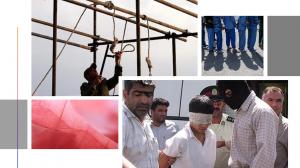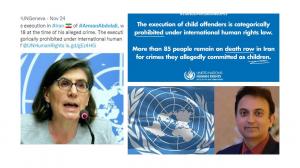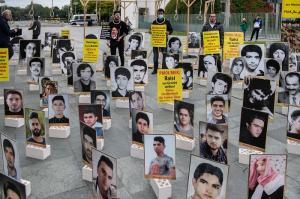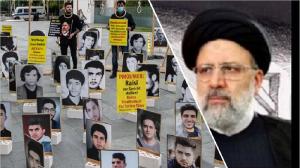
(video) Iran: Arman Was 17 Years Old at the Time of His Arrest
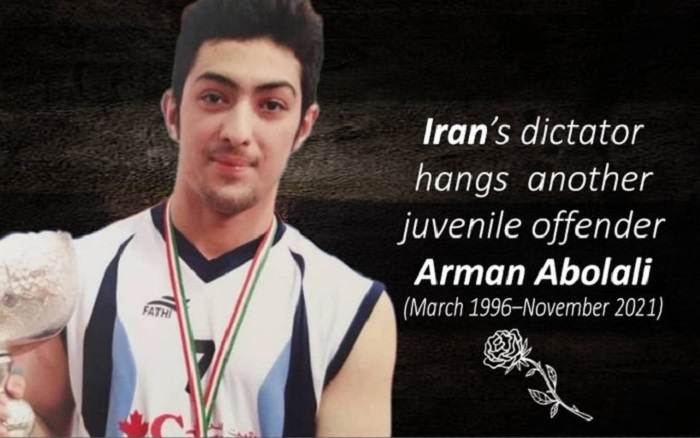
(PMOI / MEK Iran) and (NCRI): Yesterday, another international campaign to halt the execution of a juvenile offender in Iran, Arman Abdolali, was utterly ignored and carried out. Several such individuals are put to death each year.
Despite widespread international calls and protests, he was hanged in Gohardasht Prison without prior notice and a chance to meet his family for the last time.
PARIS, FRANCE, November 27, 2021 /EINPresswire.com/ -- The National Council of Resistance of Iran (NCRI) and the People’s Mojahedin Organization of Iran (PMOI / MEK Iran), reported that, on Wednesday, November 24, 2021, after eight years in prison, Arman Abdolali was executed by the clerical regime in Iran. He was arrested in 2013 at the age of 17. Arman was subjected to psychological torture by being taken to solitary confinement for execution seven times.
Despite widespread international calls and protests, he was hanged in Gohardasht Prison without prior notice and had a chance to meet his family for the last time today. His execution is a brazen violation of international treaties and conventions, including the International Covenant on Civil and Political Rights and the Convention on the Rights of the Child.
The clerical regime’s Judiciary also hanged a young couple in the city of Yasuj (southwest Iran) yesterday. The mullahs have executed at least 19 people, including a woman, in various prisons, including in Gohardasht and Ghezelhesar in Karaj, central Qazvin, Qom, Isfahan, Zahedan, Mashhad, Shiraz, and Kerman prisons, between October 23 and November 21, 2021.
The Iranian Resistance condemns the execution of Arman Abdolali. It reiterates the need for urgent action by the United Nations and other human rights organizations to save the lives of death row prisoners in Iran, especially those under the age of 18 at the time of their alleged crime. The Iranian regime’s human rights dossier must be referred to the UN Security Council, and the leaders of the ruling religious dictatorship in Iran, especially Khamenei, Raisi, and the Judiciary Chief Gholam Hossein Mohseni Eje’i, must be prosecuted for more than four decades of crimes against humanity and genocide.
The execution of a juvenile in Iran, Arman Abdolali, was utterly ignored and carried out. Several such individuals are put to death each year, and each new incident prompts an outpouring of public statements condemning the Iranian regime’s judiciary for a long list of irregularities as well as for being one of the only nations still handing down death sentences for minors.
It is estimated that the clerical regime is responsible for 70 percent of juvenile death sentences implemented throughout the world over the past 30 years. And despite the outcry from human rights organizations, Western governments, and Iranian activists and expatriates, there is no sign of the trend slowing down anytime soon. The key problem is that all of the clemency campaigns seem to simply appeal to Tehran’s conscience, ignoring the fact that it has none.
If this regime is ever to stop this or any of its myriad other human rights abuses and violations of international law, it will have to be compelled to do so. This fact is underlined by the consistently defiant tone of the regime’s responses to those international campaigns. At times, coordinated pressure succeeds in forcing the regime to delay juvenile executions, but invariably those death sentences are then carried out at a later date, after the pressure has subsided and it has become clear, once again, that the Iranian regime’s authorities will face no serious consequences for their actions.
The regime judiciary’s own so-called human rights monitor has repeatedly taken the position that the regime is not bound by international law if the law in question contradicts the regime’s stated cultural and religious principles. The practice of executing juvenile offenders ostensibly derives from the regime’s fundamentalist interpretation of Islam, which allows for boys to be considered legally responsible at the age of 13, and girls at only nine. If such backward thinking were permitted to override international law, there would be no limit to what the regime could justify.
Of course, the international community rejects Tehran’s explanations for its conduct. But each time the regime carries out a juvenile execution, or convicts a prisoner based on forced confessions, or commits any number of violations of due process, the regime is in fact permitted to violate international law. The regime never faces consequences and comes away from each controversy with an inflamed sense of impunity. Sadly, this permissiveness is part of a long tradition, and the regime’s impunity was already well established more than three decades ago.
It is bad enough that juvenile executions in recent years have gone unpunished, but it is easier to understand why Tehran doesn’t fear potential punishment when one considers that the regime carried out juvenile executions on a vast scale, without consequence, in 1988. The People’s Mojahedin Organization of Iran (PMOI / MEK Iran), a pro-democracy group that posed the first and most serious challenge to the mullahs’ theocratic dictatorship following the 1979 revolution.
In 1982, many political activists were under the age of 18 but were sentenced to multi-year prison sentences for “crimes” that included distributing pamphlets on behalf of the (PMOI / MEK Iran). Their sentences were actually light in comparison to those handed down to people with higher-profile roles within the organization. But in the summer of 1988, all were treated the same, regardless of the nature of their so-called crimes or the length of their original sentences. Several of them were hauled before the Tehran death commission to answer for their political affiliation, then sent to be summarily executed though they had been charged with no further crime.
Nationwide, many hundreds of juveniles nearly all of them supporters of the (PMOI / MEK Iran) were executed via this process over the course of about three months. This was plainly confirmed in 2016 by the release of a contemporary audio recording made by Hossein Ali Montazeri, the only high-ranking Iranian official to raise objections regarding the massacre. In the recording, released by his son, the former heir apparent to Supreme Leader Khomeini condemned his colleagues for participating in the “worst crime of the Islamic Republic” and confirmed that the then-ongoing executions were targeting children, pregnant women, and persons who had already served out their judicial sentences.
Of course, the (PMOI / MEK Iran) was aware of these details from the very beginning and had brought Western policymakers’ attention to them as well. Still, the leaked recording reinforced the veracity of the (PMOI / MEK Iran)’s account, which includes a total estimated death toll of over 30,000. With or without juveniles making up a portion of that number, the massacre is clearly recognizable as a crime against humanity, which demands international investigations leading to accountability for leading perpetrators. Chief among those perpetrators is Iran’s current president Ebrahim Raisi.
His inauguration in August was perhaps the clearest indication to date of the regime’s impunity with respect to human rights violations. Silence over Raisi’s prior role is just an extension of the same feckless Western policies that have emboldened the Iranian regime’s judiciary to continue juvenile executions in the wake of countless resolutions and action statements. What is needed now is not action statements but real action. The Iranian regime cannot possibly be expected to reform its current practices or improve its human rights record if it is not facing consequences for ongoing abuses, and has never faced consequences for severe abuses in the past.
Of course, the US and Europe have imposed economic sanctions on Tehran over its human rights abuses, but such vague pressure can only elicit vague outcomes. For the sake of real change, there must be specific penalties for specific offenses, such as the prosecution of the Iran regime’s president for crimes against humanity.
Shahin Gobadi
NCRI
+33 6 51 65 32 31
email us here
Ebrahim Raisi, Chief Regime Henchman Vies for Iranian PresidencyMay 12, 2021
EIN Presswire does not exercise editorial control over third-party content provided, uploaded, published, or distributed by users of EIN Presswire. We are a distributor, not a publisher, of 3rd party content. Such content may contain the views, opinions, statements, offers, and other material of the respective users, suppliers, participants, or authors.


